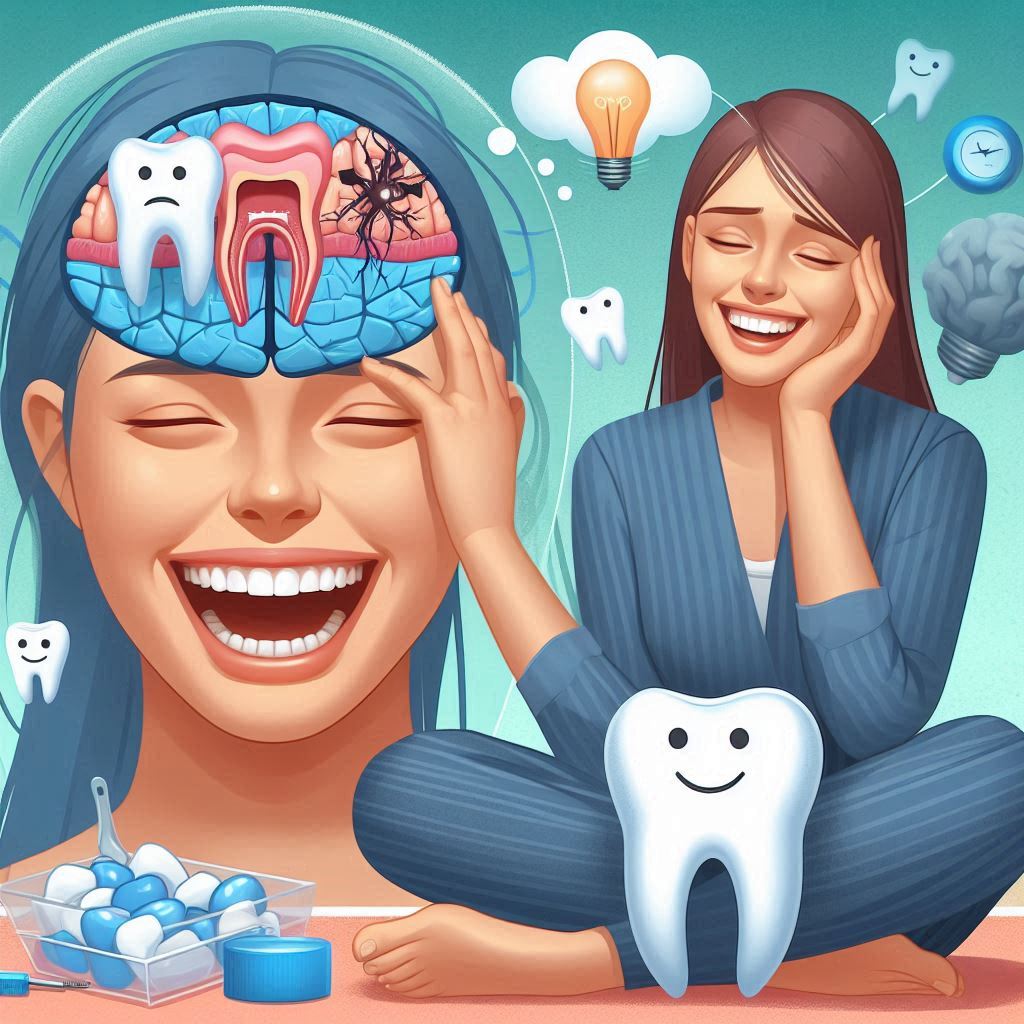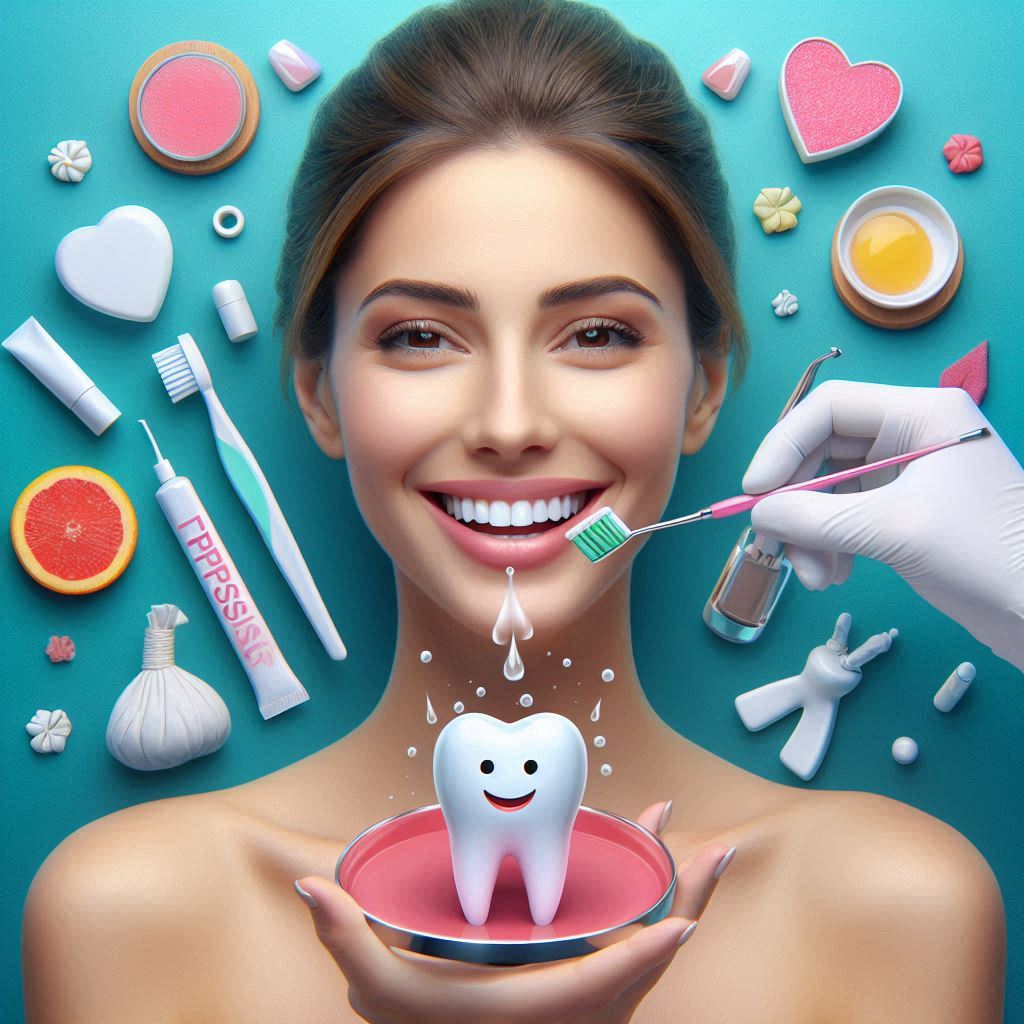Introduction
Stress is an inevitable part of daily life. Whether it’s triggered by work pressures, relationship issues, or financial strain, we all experience stress in some form. However, what many people may not realize is that stress can have significant impacts on oral health, with consequences that can range from mild discomfort to severe dental and gum issues.
The relationship between mental health and oral health is complex and bidirectional. This means that stress not only affects the body’s general health but can also harm oral structures like the teeth, gums, and jaw. Understanding how stress influences oral health is essential for anyone looking to preserve their smile and maintain a healthy mouth. This guide explores the various ways that stress can affect your teeth and gums, the biological mechanisms involved, and the broader implications of poor oral health on mental well-being. It also discusses practical steps to manage stress and maintain oral health simultaneously.
Understanding Stress and Its Impact on the Body
What is Stress?
Stress is the body’s natural response to demands or challenges. This can be triggered by external factors (like a deadline or a family emergency) or internal factors (such as personal expectations or fears). When the body perceives a threat, whether real or perceived, it responds by releasing a cascade of stress hormones—primarily cortisol and adrenaline. This prepares the body for a “fight or flight” response, increasing heart rate, blood pressure, and muscle tension, among other physiological changes.
Although this stress response is crucial in short bursts, it becomes problematic when experienced chronically, as the body is continuously in a heightened state of alert. Chronic stress can contribute to numerous health problems, including mental health conditions, cardiovascular diseases, digestive issues, and oral health problems.
Types of Stress
Stress is not a monolithic experience; it can vary in intensity and duration. There are two primary types of stress:
- Acute Stress: This is short-term stress that arises from immediate pressures or challenges. Examples include preparing for a presentation or dealing with an emergency situation. Acute stress is often transient and may not have long-lasting effects on oral health, but frequent episodes may contribute to harmful behaviors like teeth grinding.
- Chronic Stress: This is long-term stress that results from ongoing pressures, such as work overload, relationship issues, or chronic illness. Chronic stress can have more severe, lasting effects on both physical and mental health, including the health of your teeth and gums.
How Stress Affects the Body
The body’s physiological response to stress is meant to be adaptive. However, when stress becomes chronic, it can result in long-term health consequences:
- Hormonal Imbalance: Stress leads to an increase in cortisol, the primary stress hormone. Chronic elevation of cortisol levels can impair the immune system, making it more difficult for the body to fight off infections, including those in the mouth.
- Immune Suppression: Prolonged stress weakens the immune system’s ability to defend the body, leaving it vulnerable to infections and inflammation. In the mouth, this can result in gum disease, mouth sores, and delayed healing after dental procedures.
- Increased Inflammation: Chronic stress is linked to systemic inflammation, which can exacerbate various diseases, including those affecting the gums and teeth. It also contributes to conditions like periodontal disease, which is caused by inflammation of the gums.
The Link Between Stress and Oral Health
Stress and Teeth Grinding (Bruxism)
One of the most direct ways that stress affects oral health is through teeth grinding, also known as bruxism. Bruxism refers to the involuntary clenching or grinding of the teeth, often during sleep, though it can occur during the day as well. Stress is one of the leading causes of bruxism, which can result in:
- Tooth Wear: Chronic grinding wears down the enamel, the hard outer surface of the teeth. Enamel erosion leads to tooth sensitivity and can result in aesthetic concerns as the teeth become visibly worn.
- Tooth Sensitivity: As the enamel is worn down, the underlying dentin becomes exposed. Dentin is softer and more sensitive than enamel, so individuals may experience pain when eating hot, cold, or sweet foods.
- Jaw Pain and Headaches: Bruxism is often associated with TMJ (temporomandibular joint) disorders, leading to pain in the jaw, difficulty chewing, and frequent headaches. The pressure from grinding can damage the muscles and joints of the jaw, contributing to discomfort.
Stress and Gum Disease
Stress can also significantly contribute to gum disease, a common oral health issue that affects many adults. Gum disease can range from gingivitis (mild inflammation of the gums) to periodontitis (a more severe infection that can lead to tooth loss). Here’s how stress impacts gum health:
- Weakened Immune System: Chronic stress reduces the body’s immune response, making it harder for the gums to fight off harmful bacteria that cause gum disease. This can result in increased plaque buildup, which leads to gingivitis and, if left untreated, periodontitis.
- Decreased Saliva Production: Saliva is essential for washing away food particles and bacteria from the mouth. Stress can cause dry mouth (also called xerostomia) by reducing saliva production, leaving the gums more vulnerable to infections. Dry mouth also increases the risk of bad breath and cavities.
- Increased Inflammation: Stress-induced inflammation in the body can exacerbate gum disease. When the body is under stress, it produces inflammatory cytokines, which can make the gums more prone to swelling and infection.
Stress and Poor Oral Hygiene Habits
Stress can also lead to a reduction in self-care behaviors, including oral hygiene practices. People who are under constant stress may neglect their daily routines like brushing and flossing due to fatigue, lack of time, or a lack of motivation. This can cause:
- Plaque and Tartar Buildup: When brushing and flossing are neglected, plaque accumulates on the teeth. Plaque is a sticky film of bacteria that can lead to tooth decay and gum disease.
- Increased Risk of Cavities: A failure to maintain proper oral hygiene means that food particles and bacteria remain in the mouth, increasing the likelihood of cavities and tooth decay.
The Mechanisms Behind Stress and Oral Health
Hormonal Changes and Their Impact on Oral Health
When we are stressed, the body releases various hormones that can affect oral health:
- Cortisol: Known as the “stress hormone,” cortisol can affect oral health by weakening the immune system and increasing inflammation in the body. High cortisol levels can also reduce the production of saliva, exacerbating dry mouth.
- Adrenaline: Adrenaline, which is released during the fight-or-flight response, can contribute to physical symptoms like teeth grinding (bruxism). When the body is constantly in a heightened state of arousal, it can strain the jaw muscles, leading to clenching or grinding.
Behavioral Changes Linked to Stress
Stress can lead to poor lifestyle choices that negatively affect oral health. Some common behaviors associated with stress include:
- Sugar Cravings: Stress often triggers cravings for sugary foods, which can contribute to the development of cavities. Sugar is one of the primary foods for the harmful bacteria in the mouth, which produces acid and erodes tooth enamel.
- Tobacco and Alcohol Use: Many individuals turn to smoking or drinking alcohol as a way to cope with stress. Both smoking and excessive alcohol consumption are harmful to oral health. Smoking can lead to gum disease and oral cancer, while alcohol contributes to dry mouth and increases the risk of cavities.
Sleep Disturbances and Their Effect on Oral Health
Stress frequently leads to sleep disturbances, which have a direct impact on oral health:
- Teeth Grinding (Bruxism): Poor sleep quality or insomnia often exacerbates bruxism. Those who experience bruxism at night may grind their teeth subconsciously, leading to tooth wear and jaw pain.
- Reduced Saliva Production: Stress-induced sleep problems can also lead to dry mouth. This is because the body’s ability to produce saliva is compromised, which can increase the risk of cavities and gum disease.
Effects of Stress on Specific Oral Health Conditions
Cavities and Tooth Decay
Stress-induced poor eating habits—such as a higher intake of sugary foods and drinks—can accelerate the development of cavities. In addition to this, stress-induced dry mouth increases the risk of tooth decay because it reduces the mouth’s ability to wash away food particles and neutralize acids that cause cavities.
Mouth Sores and Canker Sores
Stress can trigger canker sores (also called aphthous ulcers), painful open sores that form inside the mouth. Canker sores can make it difficult to eat, speak, or maintain good oral hygiene, contributing to further oral health issues.
Gingivitis and Periodontitis
Stress is a known factor in the development of gingivitis, the mild form of gum disease. If left untreated, gingivitis can progress to periodontitis, a more serious infection that affects the deeper tissues and bones supporting the teeth. Chronic stress increases the likelihood of these conditions due to its effect on inflammation, immune function, and oral hygiene habits.
Stress Management for Better Oral Health
Stress Reduction Techniques
Managing stress effectively can help reduce its negative impact on oral health. Some common strategies include:
- Exercise: Regular physical activity can help lower cortisol levels and boost mood, which helps reduce stress.
- Mindfulness and Meditation: These techniques promote relaxation and can help alleviate anxiety and stress.
- Sleep Hygiene: Practicing good sleep habits—such as maintaining a regular sleep schedule—can reduce the impact of stress on oral health.
Maintaining Good Oral Hygiene
Despite the challenges that stress may pose, it’s important to maintain good oral hygiene practices:
- Brush Twice a Day: Brush with fluoride toothpaste to remove plaque and food particles.
- Floss Daily: Flossing helps remove plaque and food from between teeth where a toothbrush can’t reach.
- Visit Your Dentist Regularly: Regular dental checkups are essential for early detection and treatment of oral health problems.
Diet and Nutrition
Maintaining a balanced diet and managing sugar cravings can significantly reduce the risk of cavities and gum disease:
- Eat Tooth-Friendly Foods: Include plenty of calcium-rich foods, such as dairy, leafy greens, and nuts, to help maintain strong teeth and bones.
- Hydrate: Drinking plenty of water can help prevent dry mouth and flush out harmful bacteria in the mouth.
The Psychological Impact of Poor Oral Health
Poor oral health can have significant psychological consequences, leading to emotional distress, reduced self-esteem, and even social isolation. The relationship between oral health and mental well-being is bidirectional, meaning that poor oral health can contribute to stress, anxiety, and depression, while mental health issues can further exacerbate oral health problems.
Tooth Loss and Self-Image
Tooth loss is one of the most common consequences of untreated gum disease or cavities. Losing teeth, particularly if it affects the front of the mouth, can have a profound impact on one’s appearance and self-esteem. Individuals may feel embarrassed to smile or speak openly in social situations, leading to feelings of self-consciousness or social anxiety. This can result in withdrawal from social activities, avoidance of social gatherings, and a decline in overall quality of life. For some, this reduced social interaction can even contribute to feelings of isolation or loneliness.
Gum Disease and Anxiety
Gum disease, especially in its advanced stages, can cause visible signs such as swollen, bleeding gums or bad breath (halitosis). These symptoms can make people feel self-conscious and worried about how others perceive them. The fear of being judged or the discomfort associated with gum disease can lead to increased anxiety, which further perpetuates the cycle of stress and poor oral health. Additionally, the discomfort caused by gum disease—such as pain, tenderness, and swelling—can exacerbate stress and emotional distress.
Psychological Effects of Oral Health Issues
The discomfort, pain, and embarrassment caused by oral health problems can lead to more severe mental health issues. Studies show that individuals with untreated dental issues are at a higher risk of developing depression and anxiety. The chronic pain from tooth decay or gum disease, combined with the frustration of not feeling confident in social interactions, can significantly affect a person’s mental well-being.
Ultimately, addressing both mental and oral health is crucial for overall well-being. Seeking professional help for mental health, along with regular dental care, can help break this negative cycle and improve both emotional and oral health.
Conclusion
The link between stress and oral health is undeniable. Chronic stress can contribute to a wide range of dental and gum issues, including teeth grinding, cavities, gum disease, and mouth sores. Understanding the mechanisms behind stress’s impact on oral health can help individuals take proactive steps to mitigate the damage. By managing stress, maintaining good oral hygiene, and seeking professional dental care when necessary, individuals can protect both their mental and oral well-being.
It’s essential to take a holistic approach, recognizing that mental and oral health are deeply connected, and both deserve attention and care.
SOURCES
Bannister, S. L., 2019. Stress and its effects on oral health: An overview. Journal of Clinical Dentistry, 14(3), 45-50.
Calasans-Maia, M. D., 2021. Oral health and mental health: Understanding the interconnections. International Journal of Oral and Maxillofacial Health, 15(6), 234-245.
Gibson, B. M., 2018. The role of stress in oral diseases: A review of recent literature. Dental Research Journal, 45(2), 101-110.
Liu, Y., & Zhang, J. 2020. The bidirectional relationship between mental health and oral diseases: A review of psychological implications. Journal of Oral Health, 34(4), 123-135.
Luo, Y., & Zheng, H. 2022. Stress-induced bruxism and its impact on dental health. Journal of Clinical Dentistry Research, 38(7), 72-78.
Okamoto, K. S., 2017. Understanding how chronic stress affects oral health: A clinical perspective. Journal of Periodontal Research, 52(9), 761-769.
Pico, M. S., & Fernandez, R. 2021. Anxiety and stress in oral health patients: An epidemiological study. International Journal of Psychology and Dental Sciences, 22(5), 201-208.
Sakurai, M., & Takeda, Y. 2020. The impact of stress and sleep disorders on oral health: An interdisciplinary approach. Sleep Science, 13(2), 89-95.
Smith, A. R., & Howard, C. P. 2018. Stress and oral hygiene behavior: Exploring the link between emotional well-being and oral health practices. Journal of Health Psychology, 17(3), 129-136.
Williams, D. M., 2019. Psychological effects of tooth loss: A review of current research. British Dental Journal, 226(10), 724-730.
HISTORY
Current Version
February 4, 2025
Written By:
SUMMIYAH MAHMOOD




